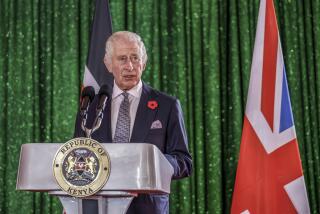Jordan’s King Hussein Calls for Forgiveness and Unity Among Arabs : Diplomacy: He reaches out to Kuwait and Iraq in a subdued speech after the ‘sad drama’ of war.
- Share via
AMMAN, Jordan — King Hussein, reaching out to both Iraq and Kuwait, called Friday for postwar unity among the Arabs and warned of “painful memories which can be transformed into hatred and rancor if they are allowed to grow and fester.”
“I do not propose to go into the details of the sad drama because you know it too well. You have lived it,” he said of the Persian Gulf crisis that divided Arab countries into hostile camps.
Addressing his pro-Iraqi populace in a nationwide radio and television broadcast, the 55-year-old monarch detailed the economic damage that the conflict brought to Jordan: unemployment, increased poverty and the collapse of its profitable trade with Iraq.
Nevertheless, he said, his government maintained a course of official neutrality.
“We did not . . . bear a grudge towards anyone, nor did we place the blame on any,” he said. “ . . . Gloating and apportioning blame are not Arab traits. . . . Forgiveness and burying the past lead to healing the wounds and closing the ranks of the (Arab) nation again.”
The tone of the speech, his first since an address on Feb. 7 that rankled Washington and led to a review of U.S. aid to Jordan, was subdued and conciliatory.
“Today our Kuwaiti brothers celebrate their return to their homes and the restoration of their independence,” he said. “We share their happiness.
“By contrast, our Iraqi brothers nurse their wounds and pain. We sympathize with them all. . . . We all bear a responsibility towards Iraq, its heritage and history. We shall stand by the Iraqi people as they look forward to rebuilding their country and to healing their wounds.”
The Jordanian monarch made no reference to Iraqi President Saddam Hussein. He also did not mention Saudi Arabia, which has shunned Jordan for its support of the Iraqi leader. But he did call for movement on the Palestinian question in postwar diplomacy. He said that the Palestinians are a people who “look to the day of salvation when they too can rejoice as do the Kuwait people today.”
Palestinians, who constitute more than half of Jordan’s population, demand that the U.N. Security Council be as firm in enforcing its resolutions demanding an Israeli pullout from the occupied territories as it was in forcing Iraqi forces to withdraw from Kuwait.
“It has been said that Palestinians showed happiness when missiles hit Israel,” the king remarked. “If that is correct, should the world not analyze the cause for this happiness?”
At the close of the speech, King Hussein touched on a political issue that was heightened by the Gulf crisis: the economic divide between the oil-rich states of the Gulf and other Arab countries that have few natural resources.
He termed it a “growing disparity between rich and poor nations” that promises “continuing social and political unrest if it is not addressed institutionally.” But he made no suggestions on how an Arab share-the-wealth program might work.
Kuwait launched a blistering attack on the Jordanian monarch hours after his speech, accusing him of abetting Iraq’s invasion of the emirate last August.
A lengthy commentary by the official Kuwait News Agency KUNA rejected the king’s appeal for Arab reconciliation and said Kuwait will never forget Jordan’s support for Saddam Hussein.
“It will be difficult for our relations with the regimes which contributed to our slaughter to return one day to how they used to be,” the agency said. “We shall never again be deceived or misled.”
More to Read
Sign up for Essential California
The most important California stories and recommendations in your inbox every morning.
You may occasionally receive promotional content from the Los Angeles Times.













